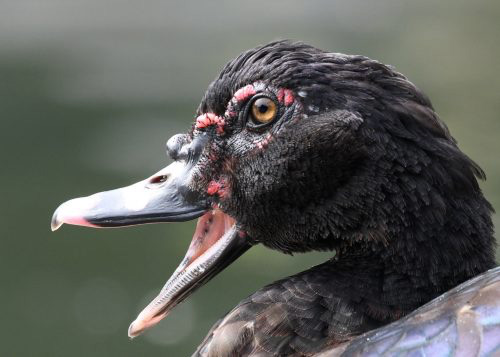





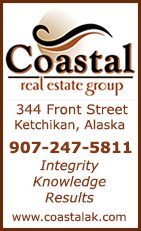









 Contact Contact 
 Webmail
Letters Webmail
Letters
 News Tips News Tips
 Copyright Info Copyright Info
 Archives Archives
Quick News
Search
 Alaska Alaska
 Ketchikan Ketchikan
 SE Alaska SE Alaska
Columns
- Articles
 Dave Kiffer Dave Kiffer
 Money Matters Money Matters
Historical
Ketchikan
 June Allen June Allen
 Dave
Kiffer Dave
Kiffer
 Louise
B. Harrington Louise
B. Harrington
Sports
 Ketchikan Links Ketchikan Links
Public Records
 FAA Accident Reports FAA Accident Reports
 NTSB
Accident Reports NTSB
Accident Reports
 Court Calendar Court Calendar
 Recent Filings & Case Dispositions Recent Filings & Case Dispositions
 Court Records Search Court Records Search
 Sex Offender Reg. Sex Offender Reg.
 Public Notices Public Notices
 Alaska Recall Alerts Alaska Recall Alerts
 Recalls.gov Recalls.gov
 AST Daily Dispatch AST Daily Dispatch
 KTN
Police Reports KTN
Police Reports
 Juneau Police Reports Juneau Police Reports
Weather,
Webcams
 Today's
Forecast Today's
Forecast
 KTN
Weather Data KTN
Weather Data
 AK
Weather Map AK
Weather Map
 AK Weathercams AK Weathercams
 AK Earthquakes AK Earthquakes

|
|

Sunday
October 11, 2020
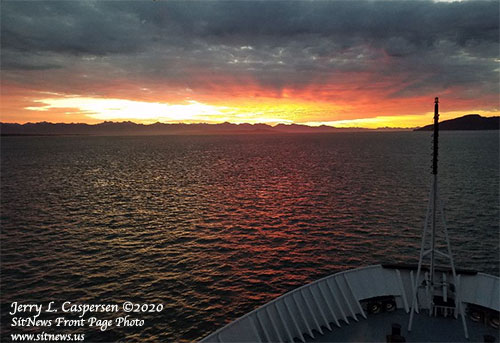
Sunrise
Just inside Cape Spencer, south of Indian pass, taken from MV Kennicott ferry.
Cape Spencer is a headland on the Alaska shore, at the side of the entrance to Cross Sound west of Juneau, Alaska. Located in Glacier Bay National Park and Preserve. Cape Spencer was given its name by Captain George Vancouver during his exploration of Southeast Alaska in 1793-1794.
Front Page Photograph by JERRY L. CASPERSEN ©2020
To have your photo featured on the front page,
email your photo(s) to editor@sitnews.us |
 |
Alaska: First Fisheries Debate Between Candidates for High-profile U.S. Senate Race Posted By MARY KAUFFMAN - Kodiak scored the first debate between candidates in one of Alaska’s most high-profile political races: the U.S. Senate.
The Kodiak Chamber of Commerce sponsored the first Alaska United States Senate candidate debate between Senator Dan Sullivan (R) and Independent challenger Dr. Al Gross. The fisheries themed debate was streamed live on Saturday evening, October 10, 2020.
Kodiak has been hosting debates for congressional and gubernatorial hopefuls since 1999 with a single focus: Alaska’s seafood industry. - Watch...
Sunday PM - October 11, 2020
Alaska: Ballot Measure 1: Oil Tax Initiative Debate Posted & Edited By MARY KAUFFMAN -
Alaska Common Ground hosted a debate on Ballot Measure 1 last week which Alaskans are voting on in the 2020 general election.
The discussion started with an overview of the ballot measure, followed by opening remarks by both for and against panelists. This was followed by discussion amongst the panelists and questions from the audience.
The debate was moderated by Drew Cason and the overview was provided by Ralph Townsend, ISER. Robin Brena and Senator Bill Wielechowski debated Aaron Schutt and Roger Marks representing OneAlaska, said to be the oil industry front group.
- More...
Sunday PM - October 11, 2020
Fish Factor: Next generation of professional fishermen, Bering Sea gets three, No urchin searchin’, and Pollock push By LAINE WELCH - More young Alaskans are officially among the next generation of professional fishermen and ocean stewards to hail from Cordova, Haines, Homer, Ketchikan and Sitka.
The futures of eight fishermen were cemented thanks to $1.5 million in loans from a Local Fish Fund (LFF) launched in 2019 that enabled them to buy into halibut and sablefish fisheries that normally would be out of reach. Buying quota shares of halibut, for example, can cost from $40 to $55 per pound.
“I'm super excited that we were able to move the $1.5 million that was provided to us to invest in new entrants. Some are deckhands and some are vessel owners. I’m just really pleased at how this has gone for this first tranche of funding,” said Linda Behnken, executive director of the Sitka-based Alaska Sustainable Fisheries Trust which worked for a decade in partnership with conservation and finance experts to craft the fund.
“The cost and risk involved in accessing Alaska’s quota share fisheries are comparable to purchasing a hotel as a first step in home ownership,” Behnken added. “As a result, the number of young rural residents entering the fisheries has dropped significantly over the past 15 years. Local Fish Fund lowers both the risk and the initial cost new entrants face.”
The fishermen will repay the loans based on the prices they get for their catch.
“It's just a really different loan instrument,” Behnken said.
The LFF works on a 10% down payment and the borrower's risk is shielded to that amount. The loan is secured by the quota shares of the fish they are purchasing. Payments are based on what the borrower makes from fishing and fluctuate as the price of fish or the quota go up or down.
Behnken said the structure allows borrowers to build equity and a credit history over a five or six-year period that should enable them to qualify for refinancing with a traditional lender.
The LFF also incentivizes ocean stewardship by giving fishermen a small break on their loan interest by participating in local projects such as electronic monitoring, mapping the ocean floor, logging bycatch to avoid hotspots or networking to keep whales away from fishing gear.
There are many opportunities for fishermen and the scientific community to team up to get a better understanding of our fisheries and the ocean environment. Some of the partners we’re working with are coming specifically from that impact investment sector that is trying to obtain conservation goals through innovative lending,” said Dustin Solberg of Cordova, a spokesman for the Nature Conservancy, which works with fishing communities around the world to develop economic incentives for good stewardship.
The Nature Conservancy, Rasmuson Foundation and Catch Together capitalized the loan fund. Craft3, a nonprofit based in Oregon and Washington, is underwriting, closing and servicing the LFF loans.
Fund managers now will take about a year to assess the LFF program and determine the timing and sizing of a future round of lending. They already have a list of interested applicants, Behnken said, and the goal is to expand LFFs to help safeguard Alaska’s fisheries for future generations. - More...
Sunday PM - October 11, 2020
|
|
Alaska: Bipartisan Legislation Addressing Crisis of Missing, Murdered, and Trafficked Indigenous Women Signed into Law - Yesterday, President Trump signed into law Savanna’s Act and Not Invisible Act, two bills led by U.S. Senators Lisa Murkowski (R-AK) and Catherine Cortez Masto (D-NV) to address the crisis of missing, murdered, and trafficked Indigenous women. Specifically, the bills work to improve the federal government’s response through increased coordination, development of best practices, and creation of a joint commission on violent crime, ensuring Alaska Natives and survivors have a voice in developing methods to end these horrible crimes.
Savanna’s Act improves coordination among all levels of law enforcement, increases data collection and information sharing, and empowers tribal governments with access to the necessary law enforcement databases in cases involving missing and murdered indigenous women and girls, wherever they occur.
Not Invisible Act improves engagement among law enforcement, tribal leaders, federal partners, and service providers. The bill also designates an official to coordinate efforts across agencies and establishes a commission of tribal and federal stakeholders to make recommendations to the Department of Interior and Department of Justice on combating the epidemic of disappearances, homicide, violent crime and trafficking of Native Americans and Alaska Natives.
“[Yesterday] we’ve reached a huge milestone in our efforts to provide justice for victims, healing for their families, and protection for women, children, and families across the nation. I’m proud that we have elevated this issue from raising awareness, to action—having created enduring policy to make real, lasting change. And the way to make that necessary change is through partnerships, coordination, and pooling resources—by working to solve this problem, together. Today we are reminding these families, they matter and their loved ones who are lost matter,” said Senator Murkowski.
Murkowski said, “Advancing these bills has been a top priority of mine and I applaud my Senate colleagues and the administration for their support in recognizing the importance of doing everything in our power to turn the tide of women and girls falling victim to this epidemic.”
“For too long, the epidemic of missing, murdered and trafficked Native women and girls has gone unaddressed. Former Senator Heidi Heitkamp bravely took up this effort in the last Congress, and I’m proud to have worked to get that legislation passed and signed by the President today. With the Not Invisible Act and Savanna’s Act, we reach a turning point in the effort to seek justice for the families of those missing and murdered, and in curbing the epidemic of violence against Native women," said Senator Cortez Masto. - More...
Sunday PM - October 11, 2020
|
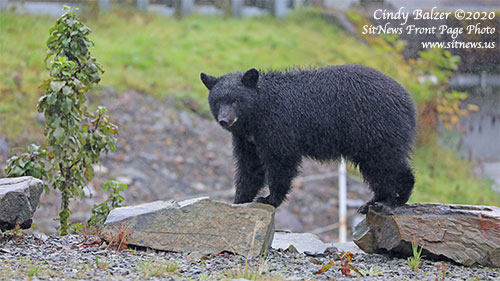
Herring Cove Bear
This mischievous young black bear makes his way around Herring Cove daily.
Front Page Photograph By CINDY BALAZER ©2020 |
|
Southeast Alaska: Bears are still active; be diligent about securing attractants - Residents of Southeast Alaska should continue to be diligent about securing garbage, livestock, pet food and other attractants because bears are now hungrier than ever as they prepare for hibernation. The Alaska Department of Fish and Game’s Division of Wildlife Conservation continues to get reports of bears in urban areas.
Fall is a key time for bears. They enter into a state called hyperphagia, in which they are exceptionally hungry as they work toward packing on the final layers of fat before hibernation. - More...
Sunday PM - October 11, 2020
Southeast Alaska: SEARHC Introduces Medicare Part D Pilot Program - To help patients secure health insurance coverage, the SouthEast Alaska Regional Health Consortium (SEARHC) recently launched a pilot program to pay patient premiums for Medicare Part D for eligible Native American and Alaska Native beneficiaries. SEARHC has identified more than 1,000 eligible patients across the Consortium who could qualify for this program to receive non-formulary medications with no out-of-pocket costs.
Medicare Part D covers most outpatient prescription drugs, including antiseizure, antidepressants, cancer treatments, and more. It is recommended that patients 65 and older sign up for Part D when first receiving Medicare. SEARHC has discovered that a large portion of Medicare beneficiaries do not pay for a Medicare Part D plan, and the SEARHC Patient Health Benefits (PHB) team is working to ensure all eligible patients are aware of this opportunity.
To qualify for the SEARHC Medicare Part D Program, patients must have Medicare A and/or Part B, no retirement insurance coverage, and reside in the SEARHC Care Network and be receiving Indian Health Services (IHS) benefits. Patients must also not be eligible for Medicaid or Medicare Extra Help program. - More...
Sunday PM - October 11, 2020
Alaska: Senators Call for More Transparency with the Alaska Division of Elections - Last week, KYUK-AM reported that over 130 residents in the village of Mertarvik did not receive primary election ballots due to an Alaska Division of Elections oversight.
Mertarvik is a newly established community in the Lower Kuskokwim region of Alaska for residents of Newtok, who have been required to relocate because of riverbank erosion. The Division has indicated that they were unaware anyone lived in the new community, despite residents living in the community for over a year. As a consequence, only 17 residents of Mertarvik voted.
“It is deeply troubling that 130 Alaskans were disenfranchised this past August,” said Senator Donny Olson (D-Golovin). “We must do everything in our power to protect Alaskans’ right to vote. Even unintended suppression of indigenous voices is simply wrong and seriously troubling.” - More...
Sunday PM - October 11, 2020 |
|
Alaska: Researchers use open-access bird data to track avian influenza By JEFF RICHARDSON - By analyzing data from dozens of migratory bird species in Asia and Alaska, an international research team has mapped the sources and spread of 15 avian influenza strains throughout the region. Using a combination of GIS and satellite mapping, machine learning and field data, researchers tracked and predicted the spread of low-level flu strains from species in Japan, Mongolia, Vietnam, Russia and Alaska.
They sampled more than 150 migratory birds from species that are known to carry avian influenza, which has the potential to cause the next pandemic. Sampled birds included internationally migrating ducks, geese, swans and songbirds, as well chickens at industrial farms. The project also collected bird data from hunters, airport confiscations and the poultry industry.
Researchers concluded that most of the viruses originated in the China region before birds carried them throughout the study area. The findings were published Oct. 8 in the journal Scientific Reports.
“We used a very nontraditional approach,” said co-author Falk Huettmann, a biology professor at the University of Alaska Fairbanks. “Usually people look at one disease and one virus at a time. Instead we took them all together and tried to find the patterns within, using machine learning and artificial intelligence.”
Huettmann said the results, which were strengthened by having widespread and openly shared data sources for model assessment, provide a strong argument that there are public health benefits to making such information more widely available.
He said more data from China, which did not provide information for the study, could be particularly helpful for tracking and assessing avian influenza, and determining where new strains could emerge. That, in turn, could help create better maps for flu routes and to overcome sampling gaps. It would also allow countries to compare their data with available health-care resources and risk factors such as unclean industrial farms, - More...
Sunday PM - October 11, 2020
|
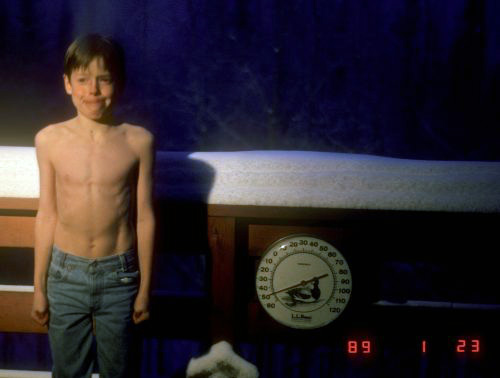
Cold tolerance not the same for everyone
By NED ROZELL
A 9-year-old Carl Tape — now a seismologist at UAF’s Geophysical Institute — poses beside a thermometer registering 50 below zero Fahrenheit during a Fairbanks cold snap in January 1989.
Photo by Walt Tape |
|
Alaska: Cold tolerance not the same for everyone By NED ROZELL - This message once came from the grandfather of 5-year-old Ben, who lived near Inverness, Scotland:
“Even in winter he will rapidly strip off and often plays in a sleeveless vest while others still have a shirt and woolly jumper on. He appears to be always warm.”
Ben, it seemed, had a remarkable tolerance for cold. His grandfather, Ged Church, was looking for answers, because Ben became distressed when he was overheated and “we would like to have a sensible chat with his teachers about it,” Church said.
There’s no doubt, some people run hotter than others. But what makes a person more tolerant of the cold? The size and shape of one’s body makes a difference, according to Jacques LeBlanc, a researcher at Laval University in Quebec.
LeBlanc wrote in “Man in the Cold.”
Also, for the same body weight, “a short person will lose less heat to the environment than a tall one. This is principally because long arms and legs form a larger surface exposed to the environment.”
Because body fat is more of an insulator than muscle, people with more fat just beneath the skin should have greater cold tolerance than skinny people.
“Shivering,” LeBlanc wrote, “is much more pronounced in thin persons.”
Shivering is a normal reaction by which the body warms itself, but the act is energy consumptive. People who seem best adapted to cold — Australian Aborigines and Kalahari Bushmen who sleep at night with no blankets — shivered much less than the western researchers who studied them.
This lack of shivering was sort of an overnight torpor accomplished by the Bushmen, LeBlanc wrote. Few other groups of people seemed to use the tactic, not even groups of far northerners, who researchers found had no exceptional cold tolerance, probably because they had developed such good clothing.
“For my part, I have never seen an Eskimo shivering,” LeBlanc wrote.
LeBlanc did much of his research in the 1960s and 1970s, but in 2003 he wrote a paper in which he looked at the psychological aspect of human cold tolerance. The physiological reasons were still mysterious, despite military and other researchers spending many hours on who could best endure the cold, and why.
LeBlanc wanted to find out if someone’s personality could play a part in his or her reaction to cold. After giving 20 young adults a personality test, he exposed them to a temperature of 50 degrees Fahrenheit for 90 minutes while they wore only shorts and a shirt.
During that time, LeBlanc recorded their skin temperature, their oxygen consumption and their discomfort rating.
He found a significant link between neuroticism and cold tolerance — people who were moody and worrisome shivered less than people with sunnier personalities.
Why might this be? - More...
Sunday PM - October 11, 2020 |
FINANCIAL FOCUS: Can You Influence Your Financial Aid Award? Provided By Ben Edwards, AAMS® - Right now, the pandemic is causing chaos and uncertainty for colleges and students. But it won’t always be that way. And if you have children who will be heading off to school in the next few years, you’re probably thinking about more typical concerns – such as expenses. How will you pay for the high costs of higher education? Most colleges do offer financial aid packages that can greatly help with these expenses. But it pays to know, well in advance, how financial aid works. And the key platform for determining much of your child’s financial aid is the Free Application for Federal Student Aid (FAFSA). In fact, if you have children starting college next year, now is the time to get going on the FAFSA, which became available Oct. 1 for the 2021-22 award year.
- More...
Sunday PM - October 11, 2020
RICH MANIERI: ATTACK ADS AN UNFORTUNATE REFLECTION OF OUR DISCOURSE - If you’re looking for a high road in political advertising, you’ll find it somewhere between the South Pole and Hades. Short of photoshopping devil horns on your opponent, anything goes. There are no rules. It’s Thunderdome, where truth is relative and context is but a rumor.
We’ve reached the point in the current election cycle when we’re all sick of attack ads. We’d probably see fewer of them if there was some hard evidence they didn’t work. One thing ad folks – political and otherwise – understand is what motivates potential customers to action.
Negative ads are nothing new. If you’re old enough you might remember Lyndon Johnson’s famous “Daisy” ad in 1964. Johnson was trying to portray his Republican opponent, Barry Goldwater, as a reckless militarist, though Goldwater himself was never mentioned in the ad.
The ad shows a little girl picking a daisy in a field and counting. Before she gets to 10, she’s interrupted by a male voice counting down a nuclear missile launch followed by a mushroom cloud. The tagline reads, “Vote for President Johnson on November 3rd. The stakes are too high for you to stay home.” In other words, a vote for Goldwater is a vote for nuclear annihilation. Unfair but effective. Johnson won in a landslide. - More...
Sunday PM - October 11, 2020
MICHAEL REAGAN: LOOKING AT THE VP DEBATE - The Kamala Harris-Mike Pence death match will go down in history as another forgettable vice presidential debate, but it had its pluses.
It showed us two important things we already knew.
It showed us that Vice President Pence is a smart, sober and able defender of Donald Trump and his record at home and overseas.
And it showed us that Sen. Harris is an empty pants suit who likes to laugh and smirk, play the race and gender cards, hide her own leftwing politics and blame the Trump administration for everything that’s wrong with the world.
The moderator, Susan Page of USA Today, didn’t help things with her loaded questions, strict time-keeping and unerring ability to cut off any real back-and-forth on any issue just as it got interesting. - More...
Sunday PM - October 11, 2020 |

Political Cartoon: Stop the Crazy
By Daryl Cagle ©2020, CagleCartoons.com
Distributed to paid subscribers for publication by Cagle Cartoons, Inc. |
|
GET THE FACTS ON PROP #1 By Mary Lynne Dahl - Alaska’s Constitution requires that our natural resources, including oil, be managed for the maximum benefit of the people of Alaska. However, big oil is getting greater benefits from our oil than the citizens of Alaska are getting.
Fact: Alaska is in serious financial crisis. Government has cut all services to the bone, threatens the Permanent Fund, has cost countless Alaskan jobs and has all but eliminated the Alaska ferry system.
Fact: Big oil made promises to Alaska in 2013 in order to get Senate Bill 21 (SB21) passed, specifically that they would increase oil production, increase jobs, increase revenue and contribute to Alaska’s growth. However, since passage of SB21 in 2014, they have failed to keep any of these promises.
Fact: Since passage of SB21, more than 5,000 oil field jobs have been lost. Production has declined. Alaska is in recession. Revenue to the state has declined by $1.6 billion from 2015 to 2017. Today, over 34% of oil field jobs are held by “outsiders” who do not reside in the state and are allowed to commute to their jobs in the oil fields. SB21 has failed.
Fact: Our PFDs are now at risk. SB21 has cost the economy of Alaska almost $7,000 per person in PFD payments from 2016 to 2020. The dividend has been cut every year since 2016 while the state continued to subsidize big oil in Alaska. Prop #1 will safeguard the PFD by eliminating subsidies to highly profitable Texas oil companies.
Fact: Alaska pays more to big oil than big oil pays to Alaska. SB21 gives tax credits, paid to big oil by Alaska in cash, plus allows big oil to deduct expenses not related to North Slope oil production, making Alaska’s oil income “net negative”. Prop#1 eliminates these credits and unrelated deductions. - More...
Sunday PM - October 11, 2020
Libertarian, Green parties united in support of election reform initiative By Jon Briggs Watts and Robert Shields - Since when have the Green and the Libertarian parties relied on a bunch of mainstream political insiders to fight our battles?
So imagine our surprise when we saw the opponents of Ballot Measure 2 claiming that the reforms proposed in the measure would hurt our two parties. If we believed for a second that they really wanted a fair shake for third parties and other independent thinkers, then we would say, “Thank you -- but we’ve got this.”
The truth is, though, the political elite are less interested in protecting the voice of each individual than they are about maintaining their own power and continuing to keep everybody else out of the conversation. The current Alaska election setup is designed to heavily favor the two major parties, which makes absolutely zero sense in a state where 63 percent of voters do not identify as either Republican or Democrat.
In spite of that glaring statistic, it is nearly impossible for anyone without a D or an R next to their name to get past the primary, let alone into office. Oh, sure, you get your occasional Democrats disguised as independents, but Alaska’s elections almost guarantee a Republican vs. a Democrat in the general election, with one or the other being the ultimate victor.
Ballot Measure 2 will finally give a voice to the nearly two-thirds of us who are muzzled by the current election laws. First of all, the costly and unfair partisan primaries will end, and all candidates will vie for Alaskans’ votes on an equal footing. Why was the State ever in the business of paying for party primaries in the first place?
Next, up to four candidates will move on from the primary to the general election, which will do away with the time-honored practice of voting for the “lesser of two evils.” We have all felt that sinking feeling of looking at a ballot and thinking, “I don’t want to vote for either of these bozos,” and in the end, we either hold our nose and vote for the one we hate less, or we don’t even vote. Ballot Measure 2 will give Alaskans more choice. - More...
Sunday PM - October 11, 2020
Email letters, opinions, OPEDs to editor@sitnews.us
|
Articles &
photographs that appear in SitNews may be protected by copyright
and may not be reprinted or redistributed without written permission
from and payment of required fees to the proper sources.
E-mail your news &
photos to editor@sitnews.us
Photographers choosing to submit photographs for publication to SitNews are in doing so, granting their permission for publication and for archiving. SitNews does not sell photographs. All requests for purchasing a photograph will be emailed to the photographer.
|
|








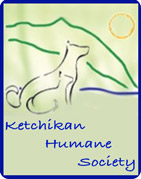


The Local Paper is
available online.
Click here for this week's printed edition (PDF)
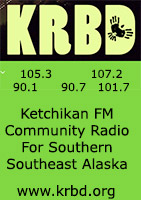
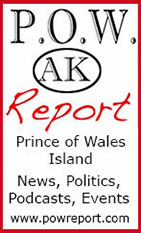

|
|

![]() Contact
Contact ![]()
![]() Webmail
Letters
Webmail
Letters![]()
![]() News Tips
News Tips![]()
![]() Copyright Info
Copyright Info![]() Archives
Archives![]() Alaska
Alaska![]() Ketchikan
Ketchikan![]() SE Alaska
SE Alaska![]() Dave Kiffer
Dave Kiffer![]() Money Matters
Money Matters ![]() June Allen
June Allen![]() Dave
Kiffer
Dave
Kiffer![]() Louise
B. Harrington
Louise
B. Harrington ![]() Ketchikan Links
Ketchikan Links![]() FAA Accident Reports
FAA Accident Reports ![]() NTSB
Accident Reports
NTSB
Accident Reports![]() Court Calendar
Court Calendar![]() Recent Filings & Case Dispositions
Recent Filings & Case Dispositions ![]() Court Records Search
Court Records Search![]() Sex Offender Reg.
Sex Offender Reg.![]() Public Notices
Public Notices![]() Alaska Recall Alerts
Alaska Recall Alerts![]() Recalls.gov
Recalls.gov![]() AST Daily Dispatch
AST Daily Dispatch![]() KTN
Police Reports
KTN
Police Reports![]() Juneau Police Reports
Juneau Police Reports ![]() Today's
Forecast
Today's
Forecast![]() KTN
Weather Data
KTN
Weather Data![]() AK
Weather Map
AK
Weather Map![]() AK Weathercams
AK Weathercams![]() AK Earthquakes
AK Earthquakes



















